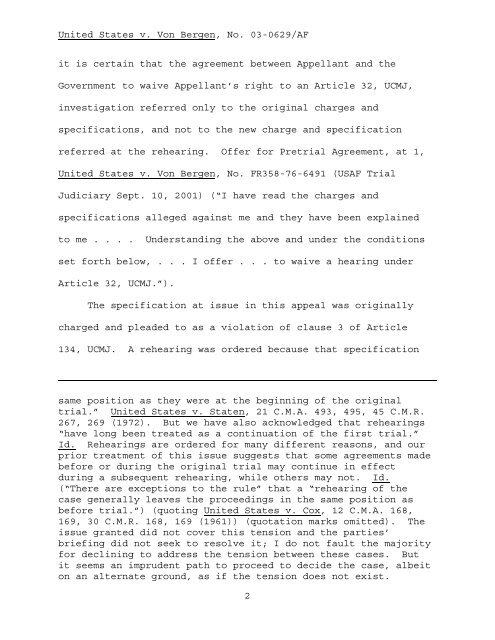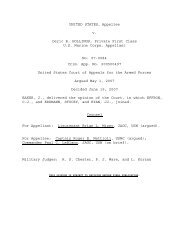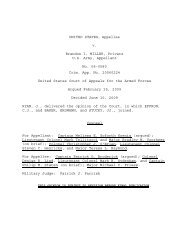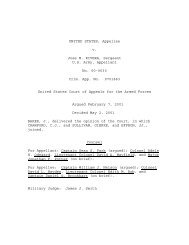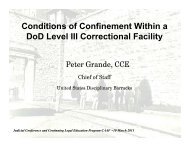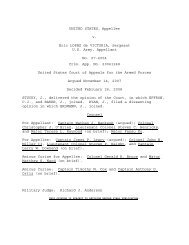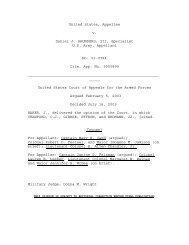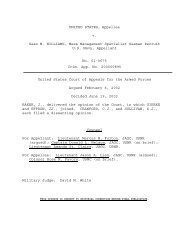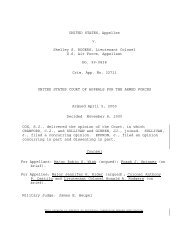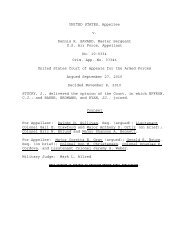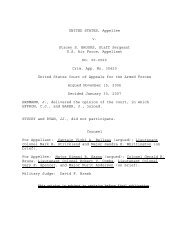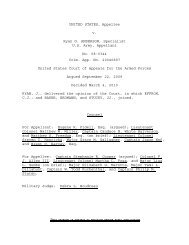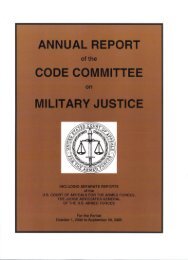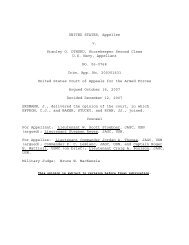United States v. Von Bergen - U.S. Court of Appeals for the Armed ...
United States v. Von Bergen - U.S. Court of Appeals for the Armed ...
United States v. Von Bergen - U.S. Court of Appeals for the Armed ...
Create successful ePaper yourself
Turn your PDF publications into a flip-book with our unique Google optimized e-Paper software.
<strong>United</strong> <strong>States</strong> v. <strong>Von</strong> <strong>Bergen</strong>, No. 03-0629/AFit is certain that <strong>the</strong> agreement between Appellant and <strong>the</strong>Government to waive Appellant’s right to an Article 32, UCMJ,investigation referred only to <strong>the</strong> original charges andspecifications, and not to <strong>the</strong> new charge and specificationreferred at <strong>the</strong> rehearing. Offer <strong>for</strong> Pretrial Agreement, at 1,<strong>United</strong> <strong>States</strong> v. <strong>Von</strong> <strong>Bergen</strong>, No. FR358-76-6491 (USAF TrialJudiciary Sept. 10, 2001) (“I have read <strong>the</strong> charges andspecifications alleged against me and <strong>the</strong>y have been explainedto me . . . . Understanding <strong>the</strong> above and under <strong>the</strong> conditionsset <strong>for</strong>th below, . . . I <strong>of</strong>fer . . . to waive a hearing underArticle 32, UCMJ.”).The specification at issue in this appeal was originallycharged and pleaded to as a violation <strong>of</strong> clause 3 <strong>of</strong> Article134, UCMJ. A rehearing was ordered because that specificationsame position as <strong>the</strong>y were at <strong>the</strong> beginning <strong>of</strong> <strong>the</strong> originaltrial.” <strong>United</strong> <strong>States</strong> v. Staten, 21 C.M.A. 493, 495, 45 C.M.R.267, 269 (1972). But we have also acknowledged that rehearings“have long been treated as a continuation <strong>of</strong> <strong>the</strong> first trial.”Id. Rehearings are ordered <strong>for</strong> many different reasons, and ourprior treatment <strong>of</strong> this issue suggests that some agreements madebe<strong>for</strong>e or during <strong>the</strong> original trial may continue in effectduring a subsequent rehearing, while o<strong>the</strong>rs may not. Id.(“There are exceptions to <strong>the</strong> rule” that a “rehearing <strong>of</strong> <strong>the</strong>case generally leaves <strong>the</strong> proceedings in <strong>the</strong> same position asbe<strong>for</strong>e trial.”) (quoting <strong>United</strong> <strong>States</strong> v. Cox, 12 C.M.A. 168,169, 30 C.M.R. 168, 169 (1961)) (quotation marks omitted). Theissue granted did not cover this tension and <strong>the</strong> parties’briefing did not seek to resolve it; I do not fault <strong>the</strong> majority<strong>for</strong> declining to address <strong>the</strong> tension between <strong>the</strong>se cases. Butit seems an imprudent path to proceed to decide <strong>the</strong> case, albeiton an alternate ground, as if <strong>the</strong> tension does not exist.2


